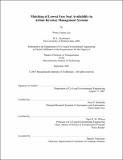Matching of lowest fare seat availability in airline revenue management systems
Author(s)
Lua, Wenyi Fabian
DownloadFull printable version (7.968Mb)
Other Contributors
Massachusetts Institute of Technology. Dept. of Civil and Environmental Engineering.
Advisor
Peter P. Belobaba.
Terms of use
Metadata
Show full item recordAbstract
By enabling passengers to compare easily and book directly from airline inventories, Internetbased ticket distribution has forced airlines to compete for the lowest price level and more importantly, to ensure seat availability at that price. To retain market share, many airlines track and match the lowest fare of their competitors -- both the price level and the associated seat availability through the use of revenue management seat inventory controls. This thesis uses simulation to examine the impacts of an airline matching its competitor's lowest fare seat availability. In a single symmetric market, simulations demonstrate that the airline using a more sophisticated revenue management system generally obtains lower revenues the more it matches the seat availability of its competitor's lowest fares -- losing as much as 9.2%. At the same time, the matched airline benefits consistently in terms of improved revenues. These findings extend to a much larger mixed-fare simulation network with four airlines: when a legacy airline matches the lowest fare seat availability of a "low-cost carrier" (LCC), the legacy airline loses at least 3.4% and as much as 8.5% in revenue. At the same time, the LCC and the other two peripheral competitors gain as much as 5.3% in revenue. The legacy airline's revenue management system recovers from the damage done to a degree that depends on the sophistication of the revenue management methods it uses. In the absence of seat availability matching, the network revenue management system using hybrid forecasting and DAVN for inventory control outperforms the leg-based system using standard forecasting and EMSRb for inventory control by 3.0% in revenues. (cont.) Moreover, using the network system, the matching airline loses 3.4% to 5.8% in revenue from seat availability matching, significantly less than the 6.2% to 7.0% of revenue it loses using the leg-based system. Unlike leg-based inventory control, network inventory control isolates the revenue loss to the LCC markets, where hybrid forecasting performs better than standard forecasting.
Description
Thesis (S.M.)--Massachusetts Institute of Technology, Dept. of Civil and Environmental Engineering, 2007. This electronic version was submitted by the student author. The certified thesis is available in the Institute Archives and Special Collections. Includes bibliographical references (p. 147-150).
Date issued
2007Department
Massachusetts Institute of Technology. Department of Civil and Environmental EngineeringPublisher
Massachusetts Institute of Technology
Keywords
Civil and Environmental Engineering.